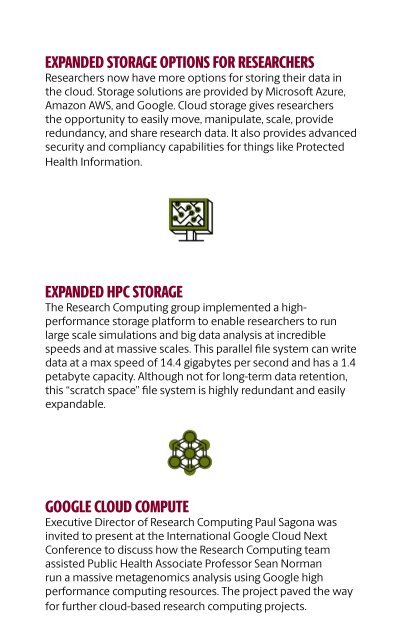2019 Annual Report
You also want an ePaper? Increase the reach of your titles
YUMPU automatically turns print PDFs into web optimized ePapers that Google loves.
EXPANDED STORAGE OPTIONS FOR RESEARCHERS<br />
Researchers now have more options for storing their data in<br />
the cloud. Storage solutions are provided by Microsof Azure,<br />
Amazon AWS, and Google. Cloud storage gives researchers<br />
the opportunity to easily move, manipulate, scale, provide<br />
redundancy, and share research data. It also provides advanced<br />
security and compliancy capabilities for things like Protected<br />
Health Information.<br />
CORE MIGRATION<br />
The Board of Trustees charged the division with upgrading<br />
the core network backbone to improve speed and reliability.<br />
In 2018, the network backbone was increased to speeds 10<br />
times faster than previous years. This year, the university’s<br />
network backbone grew to 100 GB per second. This<br />
backbone provides network and internet connectivity to<br />
250 buildings across the system, to include comprehensive<br />
and regional campuses. The upgrade increased the network<br />
throughput, frewall capabilities, and security. Internet<br />
connectivity has also improved.<br />
EXPANDED HPC STORAGE<br />
The Research Computing group implemented a highperformance<br />
storage platform to enable researchers to run<br />
large scale simulations and big data analysis at incredible<br />
speeds and at massive scales. This parallel fle system can write<br />
data at a max speed of 14.4 gigabytes per second and has a 1.4<br />
petabyte capacity. Although not for long-term data retention,<br />
this “scratch space” fle system is highly redundant and easily<br />
expandable.<br />
GOOGLE CLOUD COMPUTE<br />
Executive Director of Research Computing Paul Sagona was<br />
invited to present at the International Google Cloud Next<br />
Conference to discuss how the Research Computing team<br />
assisted Public Health Associate Professor Sean Norman<br />
run a massive metagenomics analysis using Google high<br />
performance computing resources. The project paved the way<br />
for further cloud-based research computing projects.<br />
March Madness<br />
The DoIT network operations team and system<br />
architects worked with UofSC athletics to assist<br />
with the network requirements for the NCAA<br />
March Madness Tournament. Nearly 25,000<br />
people attended the tournament this year.<br />
Athletics reached out to the DoIT because of the<br />
temporary need for much of the equipment. Afer<br />
some negotiation, Cisco loaned the university<br />
$244,728.00 worth of equipment including<br />
switches and licenses for the DoIT to use during the<br />
tournament. The teams worked to confgure all of<br />
the equipment once it arrived on site. DoIT Support<br />
teams monitored all of the network equipment<br />
and bandwidth to ensure network performance<br />
throughout the weekend.



![AnnualReport2018[V2]](https://img.yumpu.com/62812886/1/167x260/annualreport2018v2.jpg?quality=85)